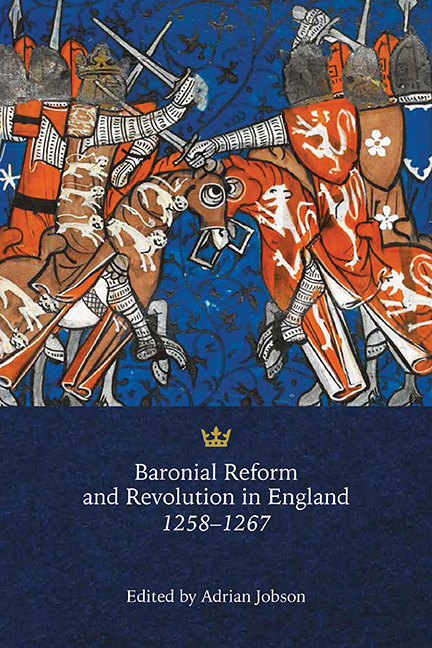Book contents
- Frontmatter
- Dedication
- Contents
- List of Illustrations
- Acknowledgements
- List of Abbreviations
- Introduction
- Modern Historians and the Period of Reform and Rebellion, 1258–1265
- The Secret Revolution of 1258
- Baronial Reform, the Justiciar’s Court and Commercial Legislation: The Case of Grimsby
- Crisis Management: Baronial Reform at the Exchequer
- Local Administration during the Period of Reform and Rebellion
- What Happened in 1261?
- Writing Reform and Rebellion
- Civic Government in Troubled Times: London c.1263–1270
- The Montfortian Bishops
- Reformers and Royalists: Aristocratic Women in Politics, 1258–1267
- The Midlands Knights and the Barons’ War: The Warwickshire Evidence
- Retinues, Agents and Garrisons during the Barons’ Wars
- The Barons’ War in the North of England, 1264–1265
- The Maritime Theatre, 1258–1267
- Reasserting Medieval Kingship: King Henry III and the Dictum of Kenilworth
- Index
Reformers and Royalists: Aristocratic Women in Politics, 1258–1267
Published online by Cambridge University Press: 21 May 2021
- Frontmatter
- Dedication
- Contents
- List of Illustrations
- Acknowledgements
- List of Abbreviations
- Introduction
- Modern Historians and the Period of Reform and Rebellion, 1258–1265
- The Secret Revolution of 1258
- Baronial Reform, the Justiciar’s Court and Commercial Legislation: The Case of Grimsby
- Crisis Management: Baronial Reform at the Exchequer
- Local Administration during the Period of Reform and Rebellion
- What Happened in 1261?
- Writing Reform and Rebellion
- Civic Government in Troubled Times: London c.1263–1270
- The Montfortian Bishops
- Reformers and Royalists: Aristocratic Women in Politics, 1258–1267
- The Midlands Knights and the Barons’ War: The Warwickshire Evidence
- Retinues, Agents and Garrisons during the Barons’ Wars
- The Barons’ War in the North of England, 1264–1265
- The Maritime Theatre, 1258–1267
- Reasserting Medieval Kingship: King Henry III and the Dictum of Kenilworth
- Index
Summary
In 1267, Hawise de Neville wrote to ‘her very dear son Hugh’, a crusader and former English rebel, to report her frustration at the obstacles that she had encountered in assisting his recovery of properties lost through his rebellion. Within her letter, Hawise implored Hugh to ‘travel with all possible haste, and … go to the court of Rome, and procure if you can the letter of the Pope, express and stringent, to the King of England, that he should restore your lands, and have them restored’. After Hugh's return to allegiance, two important manors had been restored to him in June 1266, but many of his estates remained in the hands of a royalist nobleman, Robert Walerand. With his submission, Hugh recognised Walerand's rights to his former properties and made arrangements to go on crusade to the Holy Land. In his absence, it was his mother, Hawise, and brother, John, who were entrusted with the difficult task of managing his problematic affairs in England. The role that Hawise assumed as her son's adviser and stalwart supporter reflects the centrality of women to aristocratic families, especially as wives and mothers. Family strategies were both shaped and informed by women's engagement with English political life.
Since the 1960s, aristocratic women have come to occupy an increasingly prominent place within the historiography of Henry III's reign. Biographical case studies of elite women, including Eleanor de Montfort, countess of Leicester, Isabella d’Aubigny, countess of Arundel, Isabella de Forz, countess of Aumale and Devon, and Maud de Mortimer of Wigmore, have cast new light on the roles of noble wives and widows as participants in English politics at both local and national levels. Yet the question of feminine political agency still remains to be incorporated fully into the political narrative of the period of baronial reform and rebellion in England (1258–67). To give just one example, in J.R. Maddicott's excellent study, The Origins of the English Parliament, 924–1327 , ‘the wives and daughters of the nobility’ are mentioned just once, as attendees rather than as actors at the ‘festal courts’ of twelfth-century kings, and are omitted altogether from the assessment of the work of the reforming parliaments of the following century.
- Type
- Chapter
- Information
- Baronial Reform and Revolution in England, 1258-1267 , pp. 152 - 166Publisher: Boydell & BrewerPrint publication year: 2016



